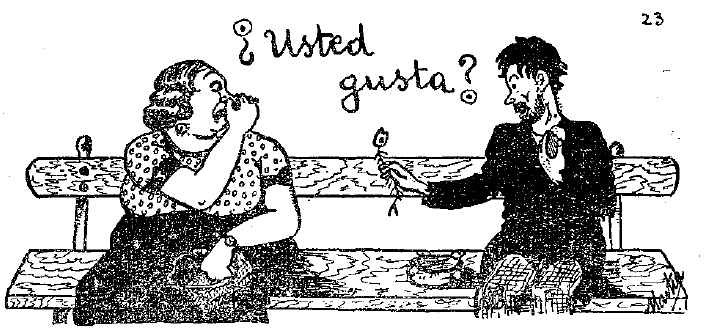
| Языки :: Испанский |
| Аудио |

 |
|
 |
|
65 |
Español |
Spanish |
|
Lección Veintitrés (23) |
||
| ¿Usted gusta? | Would you like (it)? [does it please your H.]. | |
| 1 | El almuerzo del vagón-restaurant no tiene nada de español, excepto el vino. |
The lunch in [of] the dining-car has nothing Spanish, except the wine. |
| 2 | El menú es internacional, como el publico, y como la Compañía de los coches-camas. | The menu is international, like the public, and like the Sleeping-Car Company [C. of cars-beds]. |
| 3 | Regreso a mi departamento, cruzándome con el ingles en el pasillo. | I come back to my compartment, passing the Englishman in the corridor. |
| 4 | Mis compañeras de viaje están comiendo fiambres (1), huevos duros y frutas. |
My lady fellow-travellers are eating cold meat[s], hard-boiled eggs and fruit. |
| 5 |
¿Usted gusta ? me pregunta doña Amelia. ¿Quiere usted comer? añade dona Victoria (2). |
Would you like (some)? doña Am.
asks me. |
| 6 |
Muchas gracias, acabo de comer (3), y me seria realmente imposible. |
Thank you very much, I have just eaten [finish eating], and that would be really impossible for me. |
| 7 |
He pecado por ignorancia. Se debe contestar : «Gracias, que aproveche», o « Gracias, buen provecho » (4). |
I have sinned through ignorance. One must answer : " Thank you, may you [that] profit (by it) ", or " Good appetite [profit] ". |
| 8 |
Según la cortesía española, no se debe nunca comer sin ofrecer a las personas presentes. |
According to Spanish politeness, one must never eat without offering (something) to the persons present. |
| 9 |
Creo que un verdadero caballero (5) no comería ni una sardina
en presencia de otras personas sin invitarlas con ceremonia a compartirla : |
I think that a true caballero would not even eat a sardine in the presence of other persons without inviting them ceremoniously to partake (of) it. |
| 10 |
« ¿Ustedes gustan? » o « ¿Quieren ustedes comer? » o « ¿Quieren ustedes acompañarme? » (6). |
" Would [do] you like (some)?", or "Do you want some?", |
| 11 |
Y le contestarían sin la menor ironía : « Que aproveche » o « Buen provecho ». |
And they would answer him without the least irony : " May you profit (by it) ", or " Good appetite ". |
| EJERCICIOS | EXERCISE : | |
| 1 |
¿Qué hora es, haga usted el favor? - Son las dos y cuarto. |
What time is it, please? - It is a quarter past 2. |
| 2 | ¿No ha comido usted todavía? - No, como a las dos y media. |
Have you not yet eaten? - No I eat only at half past 2. |
| 3 | En España se come muy tarde. | In Spain (people) eat late. |
| 4 |
Me levanto también muy tarde; |
I also get up very late. - I like [pleases me] to stay in bed until nine. |
| 5 | Voy a pasear, para estirar un poco las piernas; | I go for a [to] walk to stretch my legs a little. |
| 6 | regresaré a las tres y media; | I shall come back at half past 3. |
| 7 | ¿estará usted todavía aquí? | Will you still be here? |
| 8 | No, voy a la oficina a las tres y cuarto, y trabajo hasta las seis. | No, I go to the office at a quarter past 3 and work until six. |
| NOTES. | |
| 1 |
El fiambre or los fiambres, means cold meat and
cold dishes generally. We shall take a cold meal: Tomaremos fiambre. El coche (cawtchy) : the carnage. One says rather coches camas than vagones camas. |
| 2 |
Comer, to eat, same Latin root as " comestible".
- Añadir : to add. |
| 3 |
Acabar : to finish, complete, synonym of terminar. Acabar de... to finish (doing something), to have just (done s.). I have just spoken of you : Acabo de hablar de usted. |
| 4 |
Debar : must. Aprovechar, to profit by... Aprovecha usted la ocasión : you avail yourself of the opportunity. |
| 5 |
The truth : la verdad; true, veritable :
verdadero. The word vero, which one is tempted to use, on account of Italian, does not exist in Spanish; " it's true " is : es verdad or es cierto. - For caballero, see less. 28, par. 2. |
| 6 |
Usted becomes in the plural ustedes. - Usted regresará : you [your H.] will come back. - Ustedes regresarán : you [your Honours] will come back. |
| Notice, sent. 4 and 7, the use of estar and not ser (indication of place). | |
|
You will have noticed the similarity between como,
I eat, and como, how. |
